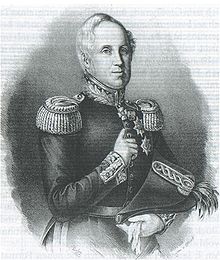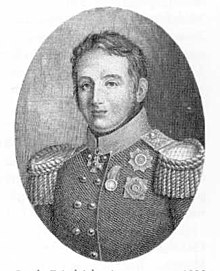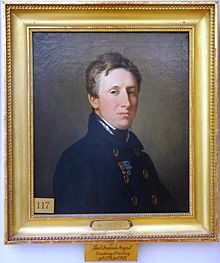August I. (Oldenburg)
Paul Friedrich August von Oldenburg (* 13. July 1783 in Rastede , † 27. February 1853 in Oldenburg ) was from 1829 bis 1853 than I. August Grand Duke of Oldenburg .
Life
Education and early years
He was born the son of Duke Peter Friedrich Ludwig and Princess Friederike von Württemberg . Together with his younger brother Georg (1784–1812) he was brought up under the strict control of his father in the spirit of the upbringing of princes in the 18th century. From 1803 to 1805 he attended the University of Leipzig and then went on two longer educational trips to England (1805-1807) and Italy (1809-1810). After the occupation and incorporation of Oldenburg into the French Empire in 1811, Paul Friedrich August and his father went into exile in Russia until 1813 .
There he stayed in Saint Petersburg at the court of Tsar Alexander I (1777-1825), who was related to the Oldenburg dukes and who appointed the prince as governor of Estonia in autumn 1811 . However, he stayed in his district for only a few months and shortly before Napoleon's Russian field began in May 1812, he joined the staff of the Russian commander-in-chief, in which he participated in the heavy retreat battles against the advancing French army. After the unexpected death of his brother Georg in December 1812, the Tsar called him back to the court to secure the Oldenburg succession to the throne. In the wake of Alexander, the prince took part in the campaigns of the Wars of Liberation in 1813 and 1814. At the request of the tsar, he returned to Estonia in the summer of 1814, where he continued to serve as governor until the spring of 1816, where he led the preparations for the revocation of serfdom .
Then he went to the small-state courts in Germany in search of a bride and then returned to Oldenburg. There he married Princess Adelheid of Anhalt-Bernburg-Schaumburg-Hoym on July 24, 1817 , the daughter of Prince Viktor II of Anhalt-Bernburg-Schaumburg , with whom he had two daughters and who died in 1820. In 1825 he married Princess Ida , the younger sister of his late wife, who also died after the birth of Hereditary Grand Duke Nikolaus Friedrich Peter (* July 8, 1827). In 1831 he got his third marriage to Princess Cäcilie of Sweden , the youngest daughter of the former King of Sweden Gustav IV Adolf .
Taking office
After the death of his father on May 21, 1829, August, now 46 years old, took office after having devoted himself intensively to government affairs as Hereditary Grand Duke since 1821. On May 28, he accepted the title of Grand Duke of Oldenburg, created by the Congress of Vienna in 1815, and patented the Duchy of Oldenburg as a Grand Duchy, giving the Oldenburg state with its three parts of the country a uniform name.
Reign
Contrary to the expectations of the population, August did not reform the Oldenburg state after the long rule of his father, but geared his policy towards the preservation of the existing conditions. It was only under the pressure of the French July Revolution of 1830 and the resulting fear of civil unrest in October 1830 that he announced in a vaguely worded proclamation the prospect of the introduction of a rural constitution , like the one in the Vienna Final Act for the establishment of the German Confederation , to which Oldenburg also belonged , had actually assured all members. August's adviser under his Minister of State Günther von Berg then submitted a draft constitution in which the Grand Duke himself participated. The Grand Duke took advantage of the ebb of the revolutionary movement and anti-democratic concerns of the related Danish and Russian ruling houses in 1832 to put the draft in 1832, apparently relieved, to the files.
Already at the end of 1831 a municipal code for the rural communities had been published as the basis for the introductory country constitution; but the popular demand for such a constitution was only fulfilled as a result of the events of 1848 . Only with reluctance and on the advice of his councilors did the Grand Duke pass the constitutional constitution agreed with the Landtag on February 18, 1849 , which, however, was revised in 1852, albeit in agreement with the Landtag , and modified the liberal work of the revolution in a conservative sense.
August ruled as an outspoken conservative , to whom constitutional ideas and the political participation of the citizens remained alien throughout his life, in the spirit of an enlightened late absolutism. In the small-scale conditions of Oldenburg, his style of government was inevitably patriarchal , whereby he endeavored, supported by an honest and efficient civil service, to administer his country conscientiously and to care for the welfare of his subjects in a benevolent, dutiful and fair manner.
He avoided difficult problems and, in the event of a conflict, gave in to greater pressure, which his biographers attribute to mediocre talent and a lack of willpower and assertiveness. He showed energy, however, with his special preference, which was for the military. As the Hereditary Prince in 1813, he had laid the organizational foundations with a military constitution drafted by him and, through the introduction of general conscription, initiated the establishment of an Oldenburg contingent, which he reorganized and increased in number after he took office. In contrast to his father, he felt himself to be a soldier through his participation in the campaign and preferred to appear in public in uniform.
His attempts to enforce a separate line against the responsible ministries in individual domestic and foreign policy issues triggered several government crises. The best-known example of this is his approach in 1850 when Denmark and Russia offered the Oldenburg Hereditary Grand Duke Nikolaus Friedrich Peter von Oldenburg to the Danish throne in order to find a solution to the Schleswig-Holstein question by appointing a German prince . As a legitimist and purely dynastic-minded monarch, Paul Friedrich August had prematurely agreed to this plan and only gave it up because of the rejection of his son and the energetic objections of Prime Minister Buttel and the Interior Minister.
representation
In honor of his father, he donated the Oldenburg House and Merit Order of Duke Peter Friedrich Ludwig on November 27, 1838 , which also showed his pronounced need for representation. He also expanded the court and promoted the construction of numerous public buildings in the city of Oldenburg in order to make its status as a grand ducal residence city also architecturally visible. He also promoted art and literature by founding the court theater , the court orchestra and the grand ducal collections .
The Augustfehn fen colony in the Ammerland district was named after the Grand Duke . Here a bronze portrait bust (built in 2006) on the village square commemorates the ruler of the then Grand Duchy of Oldenburg.
The wheel corvette Grand Duke of Oldenburg was named after him because of his efforts to help the imperial fleet .
progeny
His first marriage to Princess Adelheid († 1820), daughter of Prince Viktor II of Anhalt-Bernburg-Schaumburg, came from his first marriage in 1817 :
- Amalie von Oldenburg (* December 21, 1818 - May 20, 1875 ) ∞ King Otto I of Greece
- Friederike von Oldenburg (* June 8, 1820 - March 20, 1891 ); she later married Maximilian Emanuel of Washington , a distant relative, George Washington .
From the second marriage with Princess Ida (1804–1828), sister of the deceased Princess Adelheid, in 1825
- Nikolaus Friedrich Peter (* July 8, 1827 - June 13, 1900 ), Grand Duke of Oldenburg
In their third marriage, August 1831 married Princess Cäcilie (1807–1844), daughter of Gustav IV Adolf , King of Sweden. Come from this marriage
- Alexander Friedrich Gustav (born June 16, 1834 - † June 6, 1835 )
- Nikolaus Friedrich August ( February 15, 1836 - April 30, 1837 )
- Anton Günther Friedrich Elimar (born January 23, 1844 - † October 17, 1895 )
literature
- Johann Friedrich Ludwig Theodor Merzdorf : August Paul Friedrich, Grand Duke of Oldenburg . In: Allgemeine Deutsche Biographie (ADB). Volume 1, Duncker & Humblot, Leipzig 1875, pp. 667-669.
- Hermann Lübbing : August I .. In: New German Biography (NDB). Volume 1, Duncker & Humblot, Berlin 1953, ISBN 3-428-00182-6 , p. 446 f. ( Digitized version ).
- Hans Friedl: Paul Friedrich August, Grand Duke of Oldenburg. In: Hans Friedl u. a. (Ed.): Biographical manual for the history of the state of Oldenburg . Edited on behalf of the Oldenburg landscape. Isensee, Oldenburg 1992, ISBN 3-89442-135-5 , pp. 553-555 ( online ).
Web links
- Literature by and about August I. in the catalog of the German National Library
- Oldenburg, Paul Friedrich August I. Grand Duke of. Hessian biography. (As of April 5, 2020). In: Landesgeschichtliches Informationssystem Hessen (LAGIS).
| predecessor | Office | successor |
|---|---|---|
| Peter I. |
Grand Duke of Oldenburg 1829–1853 |
Peter II |
| personal data | |
|---|---|
| SURNAME | August I. |
| ALTERNATIVE NAMES | Oldenburg, Paul Friedrich August von |
| BRIEF DESCRIPTION | Grand Duke of Oldenburg (1829-1853) |
| DATE OF BIRTH | July 13, 1783 |
| PLACE OF BIRTH | Rastede |
| DATE OF DEATH | February 27, 1853 |
| Place of death | Oldenburg |



